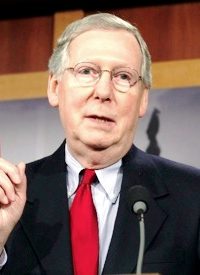
The GOP opposition to extending the Bush era tax cuts solely to the middle class has been adamant, and may lead to a compromise that would allow a tax cut extension for all Americans.
On Saturday, the U.S. Senate met to vote on the tax cut extensions for the middle class only, but the Democrats acquired the support of only 53 Senators, short of the 60 needed to overcome opposition.
The Democrats failed to assuage Republican support on Saturday by proposing measures like changing the cut-off from $250,000 a year to $1 million.
It seems now that the extension of the Bush era tax cuts to all Americans, at least temporarily, may be achieved only if the Republicans agree to extend unemployment benefits.
Senate Minority Leader Mitch McConnell told Meet the Press on Sunday that it is relatively certain the tax cuts would be maintained, at least for two to three years, but that Republicans would in turn have to support an extension of unemployment benefits.
The Republicans have remained steadfastly opposed to extending the unemployment benefits until the Democrats could show how those benefits would be financed. However, according to Accounting Today, “The release of the Labor Department’s November jobs report on Friday, in which the unemployment rate crept up to 9.8 percent, bolstered the case for extending the benefits.”
President Obama declared on Saturday that he would remain opposed to an extension of tax cuts on all Americans unless it included an extension of unemployment benefits.
“It is absolutely essential-to our hardworking middle class families and to our economy-to make sure that their taxes don’t go up on January 1,” remarked the President.
The Financial Times writes that the compromise on the Bush tax cuts may also include a ratification of the START arms control deal with Russia — a bilateral nuclear arms reduction treaty between the United States and the Russia Federation. This treaty is a follow-up to the START I treaty that expired in December 2009.
However, McConnell asserts that until the tax cut dispute is settled, and legislation is passed that will continue to fund the federal government, the Democratic leadership would not be cleared to bring up the START Treaty.
As the Democrats and Republicans move closer towards a compromise, Senator McConnell appears confident: “I think it’s pretty clear now taxes are not going up on anybody in the middle of this recession. We’re discussing how long we should maintain current tax rates.”
The only lingering question seems to be over how long the tax cuts will be extended. McConnell contends, “Obviously, the president won’t sign a permanent extension of the current tax rates, so we’re going to have some kind of extension. I’d like one as long as possible.”
According to Accounting Today, an extension of the Bush tax cuts was recommended by the deficit commission:
The report of the bipartisan deficit commission, which was voted on Friday, showed the need for the government to take steps to rein in the exploding budget deficit, but also recommended cutting tax rates and simplifying the Tax Code. The tax cut and unemployment extensions are likely to be paid for by providing revenue-raising offsets, adding billions more dollars to the projected deficit.
Some Democrats appear upset at the prospect of having to extend the tax cuts for the “wealthy,” including President Obama who made a campaign promise that he would see to it that the tax cuts for the wealthy come to an end.
Senate Majority Whip Dick Durbin of Illinois admitted on CBS’ Face the Nation on Sunday, “We’re moving in that direction, and we’re only moving there against my judgment and my own particular view of things. “
Photo: Senate Minority Leader Mitch McConnell, R-Ky., speaks during a news conference following two votes on tax cuts during a rare Saturday session of the U.S. Senate on Capitol Hill in Washington Saturday, Dec. 4, 2010: AP Images




